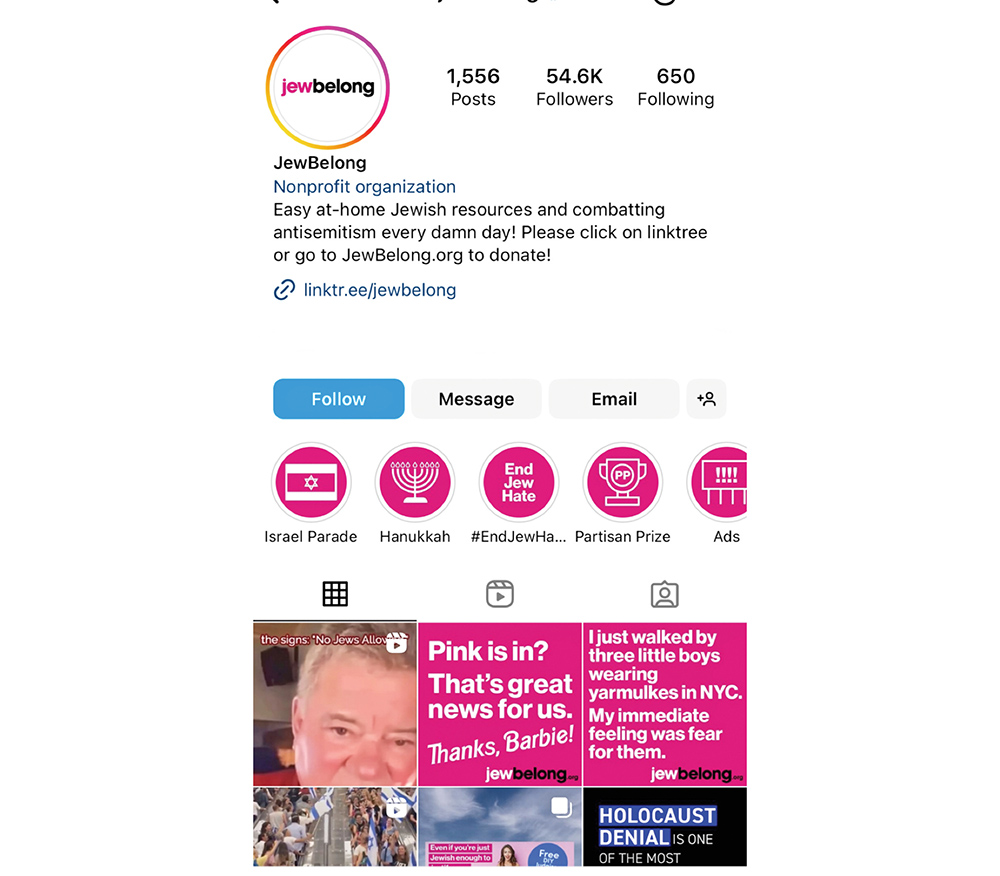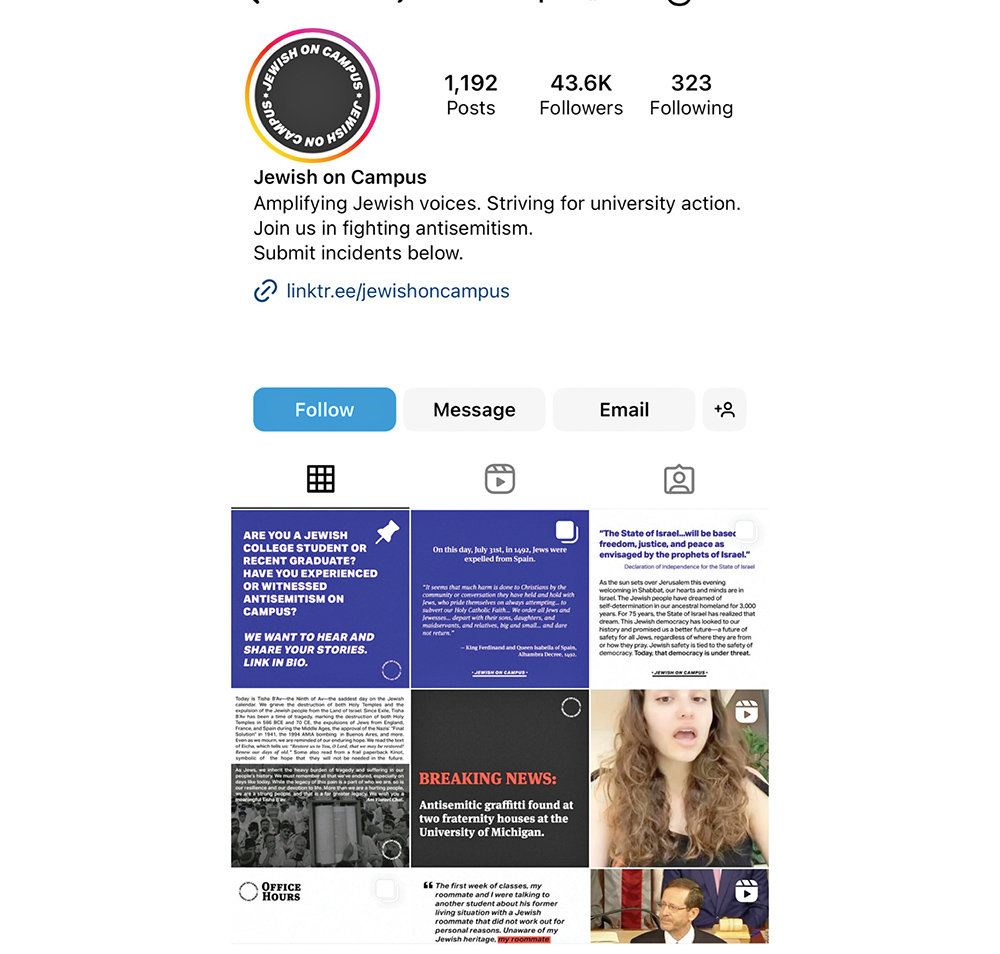How to fight antisemitism in the digital age.

Background
Amidst the political upheaval of 2020 and 2021, which included the rise of the Black Lives Matter movement, many members of Generation Z were quick to create and repost colorful, flashy and succinct infographics that advocated for a number of social causes, ranging from climate change to the #MeToo movement to police brutality.
These infographics were created in an effort to make the information contained within them accessible and digestible, with titles such as “What’s Going on in Colombia: A Simple Guide,” “Examples of Racial Microaggressions” and “Anti-Asian Hate Crimes Are on the Rise.”
However, because these infographics were posted on the vast network known as the internet, the information contained within these posts quickly became distorted, oversimplified and falsified. And users, not looking to fact-check, kept blindly reposting the messages. It wasn’t that these infographics were masquerading as all-inclusive sources; few on social media bothered to do any further research on the issues these posts raised.
An infographic was made about almost every possible event and issue. Due to the reposting, and sheer amount of different topics, practically everyone was seeing dozens of these infographics daily.
The effect of all of this was that events that many would consider to be serious ended up being watered down by the posts’ usage of bright colors, euphemisms and short bullet points. The Washington newspaper The Whitman Wire explains that this combination effectively desensitized people to the data that the infographics were presenting.
Now, some were not batting an eye when another tragic domestic or world event occurred. Every event and issue, no matter how big or small, got similar treatment. People simply reposted and scrolled, reposted and scrolled.

The Problem
Because infographics were being made about every single instance of hate, many people were no longer phased. If people had become apathetic about the 12th antisemitism-related post of the day, why should they care about the 50th?
Because antisemitism was facing similar desensitization to other social causes, the Jewish community, which has always struggled to gain the support of non-community members, now had to deal with a new layer added to the same old challenge: How do we get people to care about antisemitism in 2023?
However, Jews have been posting about antisemitism in our community and around the world long before May 2021. But recent events beg the following questions: Is posting more about antisemitism now actually harming our cause? Is being too sensitive about hate turning people off? Would posting about one antisemitic instance a month garner more sympathy than posting about one every day? Is every single instance of a swastika drawn on a school locker Instagram-worthy, or should only more direct attacks make the cut? And, if internet information is often distorted, do more posts about antisemitism mean more misinformation?
So how should we fight antisemitism online? Through my experience on social media, and based on the success of spreading awareness of other causes, I’ve come up with two sure-fire ways to get our voices heard: conversation and education. Let’s look at an example where this two-step plan has proven advantageous.

The Solution
During the 2021 Israel-Hamas conflict, the topic of Israel flooded my social media feed. Many of my non-Jewish peers were blindly reposting misinformation (oftentimes inadvertently antisemitic) on their Instagram stories, promoting BDS and the like. They too fell victim to the social media frenzy and unfortunately, did not fact-check their reposts.
These non-Jewish peers can be split into two groups. Group A was composed of people who had genuine, good intentions; they believed themselves to be contributing to the cause of world peace because that’s what the posts they were sharing marketed themselves as. However, Group B did in fact know that these posts were harming Israel.
When my Jewish peers and I explained to both groups the harm that their repostings were doing, the majority of them immediately apologized and deleted their posts, demonstrating the necessity of conversation as a tool to fight both ignorance and hate.
These same Jewish peers and I rapidly reposted content denouncing antisemitism to our majority non-Jewish following, allowing them to see these issues from our point of view and drowning out the remaining antisemitic posts from their feeds. We were educating our peers, and they now began reposting our own content, demonstrating the power of education conquering hate.
Although many non-Jewish-owned social media accounts have thankfully posted accurate information regarding antisemitism in the past, it is equally as necessary and important for the Jewish people themselves to continue to stand up to hate online in a way that has a higher chance of reaching the next generation, who make up a large portion of social media users.
Although we are past the peak of the infographics era, many infographics are still being made by many popular non-Jewish Instagram accounts such as @Impact (which focuses on all social causes) as well as Jewish ones such as @JewBelong, @HenMazzig and @JewishOnCampus (which focus on fighting antisemitism). @StandWithUs even has posts and information about how to have these same difficult conversations about antisemitism.
Knowing which online creators post information with reliable sources, and then only sharing those posts, helps immensely in the fight against misinformation regarding antisemitism.
Luckily, the aforementioned Jewish content creators have tons of accurate posts about the topic. Because, the reality is, if there are fewer conversations about antisemitism as well as fewer posts in circulation about it, young people are likely to forget that it is a real problem.
And, even if many young people view antisemitism as just another issue within an infographic, at least they see it as an issue at all. The more posts about antisemitism that people simply see, even if they don’t read through and understand every detail, the more likely they are to understand that it is a very big and very real problem, which is still crucial.
Therefore, the answer to all of the above questions is no. Posting less frequently about antisemitism won’t make people care more about the Jews.
So, continue having tough conversations about antisemitism, and continue creating and reposting conscious online content about it. Because the reality is, antisemitism is on the rise and we should absolutely be talking about it. Even if in 2023 it is impossible to get everyone to intently listen, appealing to how people consume and digest information is sometimes the only way.
Dina Shlufman of Tenafly is a Jewish Link summer intern and is a rising freshman at Cornell University.








